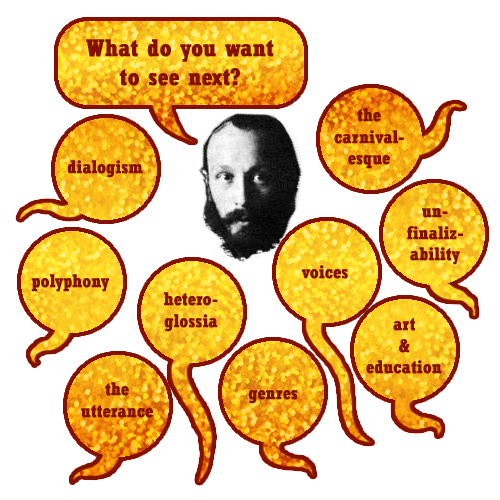

 | ||||
Bakhtin also talks of 'speech genres' ('rechevye zhanry'). This is a more
specific Bakhtinian term, and is used to describe the broad set of linguistic
conventions which speakers more or less tacitly agree upon as operative
for any particular discursive context (written or spoken). Bakhtin talks about
'primary' ('pervichnye') speech genres, also known as 'everyday genres' ('bytovye zhanry', from 'byt', meaning '(everyday] life'). 'Primary' speech
genres include talking about the weather, or ordering a round of drinks. Bakhtin talks about
'primary' ('pervichnye') speech genres, also known as 'everyday genres' ('bytovye zhanry', from 'byt', meaning '(everyday] life'). 'Primary' speech
genres include talking about the weather, or ordering a round of drinks. The
'secondary' ('vtorichnye') speech genres are generally more complex genres,
and include literary genres, as well as other forms of artistic, scientific
and political discourse, for example. The
'secondary' ('vtorichnye') speech genres are generally more complex genres,
and include literary genres, as well as other forms of artistic, scientific
and political discourse, for example.
(Roberts, 1994, p.248) |
||||
 |
 |
 | |||
| An essential (constitutive) marker of the utterance is its quality of being
directed to someone, its addressivity. As distinct from the signifying units of a
language - words and sentences - that are impersonal, belonging to nobody and
addressed to nobody, the utterance has both an author (and, consequently,
expression, which we have already discussed) and an addressee.
... Both the composition and, particularly, the style of the utterance depend on those to whom the utterance is addressed, how the speaker (or writer) senses and imagines his addresses, and the force of their effect on the utterance. Each speech genre in each area of speech communication has its own typical conception of the addressee, and this defines it as a genre. (Bakhtin, 1976/1986, p. 87) |
||||
 | ||||
|
So there are two types of genre, the informal primary ones (again, primacy is placed on the common, the everyday), and the more structured secondary ones. And the genre of an utterance is determined by the speaker's relation to the addressee. How do the more complex secondary genres develop? |
||||
 |
 |
 | |||
|
The extreme heterogeneity of speech genres and the attendant difficulty of
determining the general nature of the utterance should in no way be underestimated.
... During the process of their formation, they absorb and digest various primary (simple) genres that have taken form in unmediated speech communion. These primary genres are altered and assume a special character when they enter into complex ones. They lose their immediate relation to actual reality and to the real utterances of others. For example, rejoinders of everyday dialogue or letters found in a novel retain their form and their everyday significance only on the plane of the novel's content. They enter into actual reality only via the novel as a whole, that is, as a literary artistic event and not as everyday life. The novel as a whole is an utterance just as rejoinders in everyday dialogue or private letters are (they do have a common nature), but unlike these, the novel is a secondary (complex) utterance. (Bakhtin, 1976/1986, p. 82) |
||||

Ayers, W., & Alexander-Tanner, R. (2010). To teach: The journey, in comics. New York, NY: Teachers College Press.
Bakhtin, M. M. (1981). Discourse in the novel (C. Emerson & M. Holquist, Trans.). In M. Holquist (Ed.), The dialogic imagination: Four essays by Mikhail Bakhtin (pp. 259-422). Austin, TX: University of Texas Press. (Original work published 1975).
Bakhtin, M. M. (1981). Epic and Novel (C. Emerson & M. Holquist, Trans.). In M. Holquist (Ed.), The dialogic imagination: Four essays by Mikhail Bakhtin (pp. 3-40). Austin, TX: University of Texas Press. (Original work published 1941).
Bakhtin, M. M. (1981). Forms of time and of the chronotope in the novel (C. Emerson & M. Holquist, Trans.). In M. Holquist (Ed.), The dialogic imagination: Four essays by Mikhail Bakhtin (pp. 84-258). Austin, TX: University of Texas Press. (Original work published 1937).
Bakhtin, M. M. (1984). From Rabelais and his world (H. lswolsky, Trans.). In P. Morris (Ed.), The Bakhtin reader (pp. 195-244). New York, NY: Oxford University Press. (Original work published 1965).
Bakhtin, M. M. (1984). Problems of dostoevsky's poetics. (C. Emerson, Trans.). Minneapolis, MN: University of Minnesota Press. (Original work published in 1963).
Bakhtin, M. M. (1986). From speech genres and other late essays (H. lswolsky, Trans.). In P. Morris (Ed.), The Bakhtin reader (pp. 81-87). New York, NY: Oxford University Press. (Original work published 1976).
Cuenca, A. (2010). Democratic means for democratic ends: The possibilities of Bakhtin's dialogic pedagogy for social studies. The Social Studies, 102(1), 42-48.
Dimitriadis, G., & Kamberelis, G. (2006). Theory for education. New York, NY: Routledge.
Miles, A. P. (2010). Dialogic encounters as art education. Studies in art education: A journal of issues and research 51(4), 375-379.
Roberts, G. (1994). A glossary of key terms. In P. Morris (Ed.), The Bakhtin reader (pp. 245-252). New York, NY: Oxford University Press.
Rule, P. (2011). Bakhtin and Freire: Dialogue, dialectic and boundary learning. Educational philosophy and theory 43(9), 924-942.